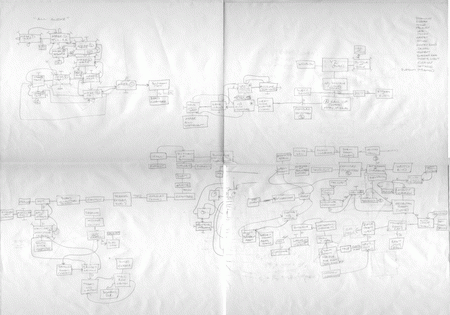If you are a gaming geek of a certain age, the phrase “get lamp” should evoke a whole series of memories. For me they remind me of nights spent in the basement of McGregor House at MIT, where I played Adventure, the first computer text game, on a DEC line printer terminal (complete with 300 baud modem!).
Get Lamp is also the name of a new documentary about the world of computer text adventures, released a few months ago by director Jason Scott. It’s a classic rise-and-fall story, packed full of interviews with the people responsible for the creation of the art form, and, due to a series of coincidences, it includes me as well.
I was at the release party for Guitar Hero II, the sequel to the runaway hit by Harmonix, a Cambridge-based company started by a few grad students from the Media Lab. The Harmonix COO was Mike Dornbrook, an old MIT colleague who had survived the rise and fall of Infocom, the leading creator of text adventures, also founded by MIT students decades earlier. I saw Mike and went to say hello when I noticed he was talking to a very earnest fellow I didn’t recognize. Mike broke off the conversation to say hello to me, since we hand’t see each other in a few years. He apologized for having to leave, saying he was about to take a “life-changing telephone call” back at the office (which turned out to be the agreement to be purchased by Viacom).
That left me with the other guy, who asked me “How do you know Mike Dornbrook so well?”
“We were classmates at MIT.”
“You were around when Zork was written?”
“Yup. I watched Mike and his friends start Infocom.”
“Then I need to interview you for my next film.” He introduced himself as Jason Scott, a name I recognized from his stint as a guest blogger at Boing Boing. (Remember when they ran a guest blog in the sidebar?) He had just released BBS, a documentary about early computer bulletin board systems. He told me his next project was going to be about computer text adventures, and , a few months later, we spent a few hours in my office talking about Infocom and MIT.
[podcast]http://blog.belm.com/belmblog/audio/infocom.mp3[/podcast]
This is what they were printing:
That part of the conversation, along with a few other excerpts, is included in one of the DVD bonus features, Examine Infocom. I’m also in the main movie, in the section about creating maps of the games; my Adventure map is prominently featured.
(Yes, I finished the game. No, I didn’t collect all of the points. Yes, I have a separate matrix mapping of the mazes. No, I don’t apologize for being a geek.)
Ars Technica has a much better review of the DVD than I could ever write, so I encourage you to check it out. (He Who Will Not Be Ignored has a review as well: “My dad’s in a movie! It’s awesome!”) Watching the DVD was a bittersweet experience for me; it was difficult to watch friends succeed and then fail as newer technology – computers with powerful graphics processors – made their work “obsolete.”
But, as the final section of Get Lamp shows, there’a still a large active community out there that is interested in interactive fiction. One of the current practitioners, Andrew Plotkin, has raised more than $20,000 via Kickstarter to write Hadean Lands, an interactive text adventure for the iPhone.
I like playing graphics-intensive games on the PS3, Xbox, and Wii as much as the next person, but games with unusual plots are few and far between because they don’t sell. That’s why text adventures never really died; they are as varied as favorite books that you can pull of the shelf and immerse yourself in at your own pace. The appeal is sumarized neatly in the coin that comes with every copy of Get Lamp:





I remember playing Colossal Cave Adventure on a Decwriter. That, and Star Trek. You could play Star Trek, but it had to redraw the field after every move. It was slow. I had some other text adventure games on my Apple II, but now I don’t remember what they were. But now you’ve made me go and find an OS X version of it.